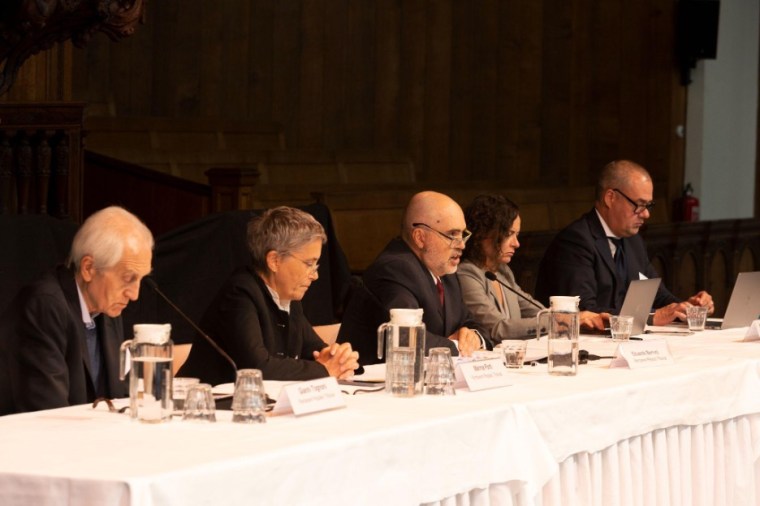The Hague, September 20, 2022 – The independent panel of judges of the People’s Tribunal pronounced its judgment yesterday in a trio of cases of murdered journalists. The unanimous verdict concluded that “throughout their acts and omissions including the lack of investigations, the lack of reparation to the victims, and full impunity, the states of Mexico, Sri Lanka and Syria are guilty of all human rights violations brought against them in the indictment by the Prosecution.” The verdict was broadcast live and recordings can be watched in English, Arabic and Spanish.
This symbolic act of justice represents a meaningful international recognition of the complicity of these states in impunity for the murders of Miguel Ángel López Velasco (Mexico), Lasantha Wickrematunge (Sri Lanka) and Nabil Al-Sharbaji (Syria). The cases also create an important record of evidence and testimony for any future proceedings, and elevate the importance of holding states internationally accountable for failing to protect journalists and investigate and prosecute those who murder them.
Over 100 participants including colleagues, relatives and friends of journalists who were killed in reprisal of their work, gathered to hear the verdict first-hand. The tribunal, though symbolic in nature, aims to make a concrete contribution to the fight against impunity. Christophe Deloire, Secretary-General of Reporters Without Borders, said “the fact that we have this tribunal is the first sign of hope. Though your tribunal does not have the capacity to put the perpetrators behind bars, you have the capacity to name and shame.”
To that end, the judges delivered the following verdict:
“In view of the overwhelming and compelling evidence consisting of witness testimony including that of expert witnesses and those with personal experience; very substantial written documentation from individuals and organisations, the Tribunal has unanimously made the following finding:
Through their acts and omissions (the lack of investigation, the lack of reparation to the victims, and the full impunity) the States of Mexico, Sri Lanka and Syria are guilty of all of the human rights violations brought against them in the indictment.”
The indicted states were informed timely of their rights to a defense, but none of them responded or offered a defense.
The judges called out the lack of action on the part of states and offered powerful recommendations to states and the international community to take action. The recommendations and full judgment will be available soon via www.saferworldforthetruth.com/tribunal. That call was reiterated by one of the panel members who commented on the judgment, Nadim Houry, saying: “It’s time to be bolder. We need to push the UN to get out of its comfort zone.”
After the verdict, a ceremony took place to commemorate all journalists who have lost their lives in reprisal for their work. Photos of journalists from all over the world, including Mexico, Afghanistan, Serbia and many other countries were brought to the empty chairs representing all the journalists who were killed in the line of duty.
Mexican journalist Anabel Hérnandez made a moving speech talking about the right to freedom of information and said “[these journalists] did not die to defend their own freedom of expression. They died for the right of society to be informed. The goal of their assassination was not just to silence their voices, but to deprive society from the tools it needs to decide the course of its history. They are no longer here. Because of their absence, there are white pages that will forever remain empty without their words, without their voice, without their free thought.”
Participants in the closing hearing included three members of the High Level Panel of Legal Experts on Media Freedom: Baroness Helena Kennedy, Nadim Houry and Dr. Chile Eboe-Osuji. The High Level Panel which also includes Amal Clooney, advises the Media Freedom Coalition and is now leading the way for proposals to conduct and support investigations into violence against journalists worldwide.
The Tribunal brought forward unique evidence, including cell site data implicating the involvement of Gotabaya Rajapaksa, president of Sri Lanka until July 2022. Key experts such as Mexican investigative journalist Anabel Hernández, 2021 Nobel Peace Prize laureate Maria Ressa, and one of Syria’s most renowned human rights activists Mazen Darwish have also contributed key evidence in the form of witness testimony, joined by (former) police inspectors and prosecutors, representatives of the United Nations and the High Level Panel of Legal Experts on Media Freedom.
